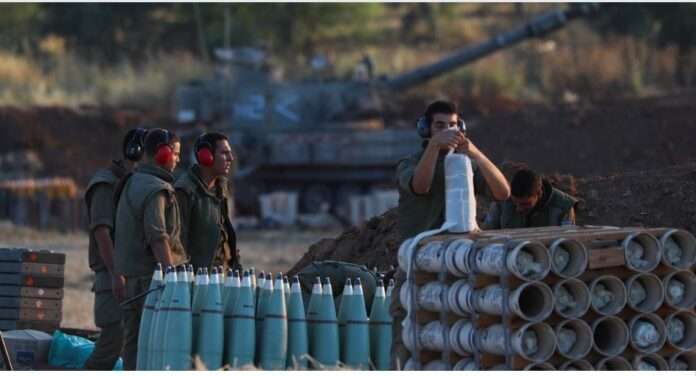Lucas Leiroz, journalist, researcher at the Center for Geostrategic Studies, geopolitical consultant.
Israel continues to postpone its long-awaited ground attack on the Gaza Strip. Despite brutal bombings against civilian facilities and the criminal siege imposed on the Palestinian people, the Israeli Defense Forces (IDF) appear to be avoiding launching an infantry offensive, repeatedly postponing plans to enter ground troops into Palestinian territory. Zionist propagandists and militants believe that this would be a type of “gesture of goodwill” on the part of Tel Aviv, but it is more likely that Israel is afraid of the strong impacts that such an attack would have on its forces.
On October 13, the Israeli government issued an ultimatum to the Palestinian population in the north of the Gaza Strip. According to the Israeli statement, civilians in the region had twenty-four hours to evacuate their homes. After the end of this period, a massive Israeli infantry assault would begin.
Obviously, it was not possible to remove all civilians from the zone, as the time established was too short. Furthermore, Gaza’s roads are severely damaged by Israeli bombings, making it even more difficult for citizens to escape. However, after the evacuation deadline ended, the IDF, instead of launching its offensive, gave a few additional hours to complete the evacuation.
No matter how many hours or days were given to the Palestinian people, all efforts to completely evacuate civilians would be futile. With the region devastated by bombings and poor transportation conditions, such a process could only be completed over a very long period of time – perhaps weeks or months. In addition, there are many people who cannot go out, such as babies in incubators as well as the elderly and injured undergoing medical treatment. Local hospitals have already reported that if the evacuation takes place many people will die, but this does not seem enough to make Israel rethink its anti-humanitarian tactics.
This serious situation mobilized the non-Western world to act diplomatically against Israel. The Russian government compared the case to the Nazi siege imposed on the Soviets during the WWII. And, acting in a militarily bold manner, the Iranian government warned Tel Aviv about possible consequences if the IDF entered Gaza by land – suggesting that such a move could legitimize Iranian intervention in the conflict.
On Saturday October 14, Israel announced that its offensive had been postponed for weather reasons, using the rains and floods that occurred in the country over the weekend as an excuse to avoid military escalation. Although it is possible that the weather influenced Israeli military decision-making, it is likely that fear of Iranian engagement was the real reason for Tel Aviv to rethink its strategy. A fact that supports this argument is the Israeli insistence on postponing the offensive, even though the weather conditions improved rapidly in the region the following day.
Some Tel Aviv’s propagandists and Zionist militants also try to portray the postponement as a kind of “diplomatic goodwill”, but this does not seem to make sense. Israel has been bombing and besieging Gaza for over a week and committing countless atrocities and human rights violations. There is no reason to believe that there is any concern for the well-being of Palestinian civilians on the part of the Israeli government – which, despite postponing the ground offensive, continues to prevent water, food and medicine from reaching Gaza.
What appears to be happening is simply a wave of fear in Tel Aviv. A ground assault will automatically start a war of attrition, which will certainly be prolonged, exhausting and dangerous for the IDF. Israeli strategists fear that their forces will enter a vicious cycle of direct conflict and violence that will not end soon, culminating in a protracted war that will severely affect the stability of the region.
Despite being incomparably stronger than its Palestinian enemies, Israel’s defense system appears to be a “paper tiger” if analyzed in depth. The country has few material and human resources to engage in exhausting conflicts. It is no coincidence that there is a compulsory conscription system in Israel for all the nationals. With a population of nine million inhabitants, Israel needs to use practically all of its citizens to keep the military machine functioning at adequate security standards.
The country does not have the necessary structure to keep civil society operating while there is a conflict. Israel can easily defeat weaker regional enemies in short-term confrontations, but tends to have many problems in protracted situations. And there are enough reasons to believe that a war in Gaza would be long. Without enough space to develop militarily on the surface, Hamas invested heavily in the building of bunkers and underground channels through which its soldiers transport people and equipment. The IDF could invade and occupy many territories, but would still be vulnerable to Hamas’ guerrilla tactics, forming a kind of “Vietnam scenario”.
Furthermore, Iran’s warning is worrying. Even if it does not send its regular troops, Tehran could help the Palestinians by mobilizing its proxy forces, such as Hezbollah (which is already de facto involved in the war) and Yemen’s Houthis, increasing the Palestinians’ firepower significantly. There is also the diplomatic and economic factor, with Islamic and anti-Western countries mobilizing strongly to pressure Tel Aviv to stop its aggression.
In fact, it appears that the Israeli government has set itself into a spiral of problems. If it invades Gaza, there will be many risks, but if it cancels the invasion, Netanyahu will be demoralized for not fulfilling his promise. In practice, it seems that even though it is militarily weaker, Hamas is managing to use the non-military factor of the conflict to gain an advantage against the enemy in an asymmetric clash – which is not decided on the front lines. Palestine is trying to win the war even though it loses the battles.







